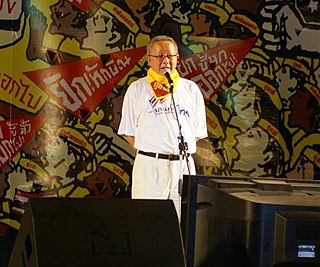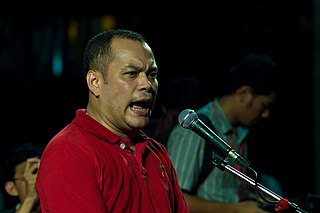
Until 22 May 2014, the politics of Thailand were conducted within the framework of a constitutional monarchy, whereby the prime minister is the head of government and a hereditary monarch is head of state. The judiciary is independent of the executive and the legislative branches.

Thaksin Shinawatra is a Thai businessman, politician and visiting professor. He served in the Thai Police from 1973 to 1987, and was the Prime Minister of Thailand from 2001 to 2006.

The Thai Rak Thai Party was a Thai political party founded in 1998. From 2001 to 2006, it was the ruling party under its founder, Prime Minister Thaksin Shinawatra. During its brief existence, Thai Rak Thai won the three general elections it contested. Eight months after a military coup forced Thaksin to remain in exile, the party was dissolved on 30 May 2007 by the Constitutional Tribunal for violation of electoral laws, with 111 former party members banned from participating in politics for five years.
The Democrat Party is a Thai political party. The oldest party in Thailand, it was founded as a royalist party, and now upholds a conservative and classically liberal pro-market position.

Mark Abhisit Vejjajiva is a British Thai politician who was the prime minister of Thailand from 2008 to 2011. He is a former university lecturer at Chulachomklao Royal Military Academy and Thammasat University, and was the leader of the Democrat Party from 2005 until he resigned following the party's weak performance in the 2019 election. As leader of the second largest party in the House of Representatives, he was also leader of the opposition – a position he held from December 2008 until his party's en masse resignation from the House on 8 December 2013. That same month, he was formally charged with murder resulting from a crackdown on demonstrators in 2010 that killed 90 people.

Sondhi Limthongkul is a Thai media mogul and leader of the right-wing People's Alliance for Democracy (PAD). He was elected leader of the New Politics Party (NPP).

Somkid Jatusripitak is a Thai economist, business theorist, and politician.
In 2005 and 2006, a series of events occurred in Thailand as a result of public anger with Prime Minister Thaksin Shinawatra that was supported by Sondhi Limthongkul and his coalitions. It led a military coup that concluded in the overthrow of the Thai Rak Thai government in September 2006, the flight of Thaksin after the court verdict, and the establishment of the junta government led by Surayud Chulanont, a favourite of privy councillor and senior statesman Prem Tinsulanonda.

The People's Alliance for Democracy (PAD) is a Thai political movement and pressure group. It was originally a coalition of protesters against Thaksin Shinawatra, the former Prime Minister of Thailand.
Manager Daily 360 Degree is a Thai-language daily newspaper published in Bangkok and distributed nationwide. The paper is a broadsheet, and emphasizes political and business news. Founded by media-mogul Sondhi Limthongkul, it was an outgrowth of Manager Monthly magazine and Manager Weekly newspaper. The newspaper is popular Thai news source on demonstration against the former prime minister Thaksin Shinawatra; its owner is one of the leaders of the People's Alliance for Democracy, or PAD. The newspaper declares its views and objectives are to support Constitutional Monarchy, to resist authoritarianism in politics and in the economy, and to promote restrictions on the power of government and of politicians.

Somkiat Pongpaiboon was a Professor at Nakhon Ratchasima Rajabhat University, Nakhon Ratchasima Province, Thailand. Now, He became a member of the Thai House of Representatives in 2007 from Democrat Party and a leader of the People's Alliance for Democracy, and the co-founder of the Mass Party. Somkiat is an advocate for the poor and a major critic on Prime Minister Thaksin Shinawatra.

Sonthi Boonyaratglin is a Thai former Commander-in-Chief of the Royal Thai Army and former head of the Council for National Security, the military junta that ruled the kingdom, of Iranian descent. He was the first Muslim in charge of the army of the mostly Buddhist country. On 19 September 2006, he became the de facto head of government of Thailand after overthrowing the elected government in a coup d'état. After retiring from the Army in 2007, he became Deputy Prime Minister, in charge of national security.
The 2006 Thai coup d'état took place on 19 September 2006, when the Royal Thai Army staged a coup d'état against the elected caretaker government of Prime Minister Thaksin Shinawatra. The coup d'état, which was Thailand's first non-constitutional change of government in fifteen years, followed a year-long political crisis involving Thaksin, his allies, and political opponents and occurred less than a month before nationwide House elections were scheduled to be held. It has been widely reported in Thailand and elsewhere that General Prem Tinsulanonda, Chairman of the Privy Council, was the mastermind of the coup. The military cancelled the scheduled 15 October elections, abrogated the 1997 constitution, dissolved parliament and constitutional court, banned protests and all political activities, suppressed and censored the media, declared martial law nationwide, and arrested cabinet members.

The People's Power Party is a defunct Thai political party. The party leader was Somchai Wongsawat, the Party Secretary General was Surapong Suebwonglee, and the Party Spokesperson was Kuthep Saikrajarng. Most MPs of the party originally hailed from the Thai Rak Thai Party and thus the party was its de facto reincarnation with former prime minister Thaksin Shinawatra as its "leader." The PPP had a populist platform and was strong in the North, Central, and Northeastern regions of Thailand. The party became the leader of the coalition government after the junta-government supported 2007 general election. PAD, the leading anti-Thaksin movement, vowed to oppose it after the party decided to launch the amendment of the 2007 Constitution.

Beginning in 2008, there was worsening conflict between the People's Alliance for Democracy (PAD) and the People's Power Party (PPP) governments of Prime Ministers Samak Sundaravej and Somchai Wongsawat. It was a continuation of the 2005–2006 political crisis, when PAD protested against the Thai Rak Thai (TRT) party government of Prime Minister Thaksin Shinawatra. PAD followers usually dressed in yellow, yellow being the royal color of King Bhumibol Adulyadej, and were called "yellow shirts". National United Front of Democracy Against Dictatorship (UDD) followers, known as supporters of the deposed prime minister Thaksin Shinawatra, dressed in red and were widely called "red shirts".

Nattawut Saikua is a Thai politician. He is the secretary-general and spokesman of the United Front for Democracy Against Dictatorship, and a Member of Parliament for the Pheu Thai Party list. In 2008, he was spokesman for the Somchai Wongsawat government. From January 2012 to May 2014, he served as Deputy Minister in Yingluck Shinawatra's cabinet.
Chaturon Chaisang or Chaisaeng is a Thai politician. He was a government member for several terms, serving as Minister of Justice, Deputy Prime Minister, and Minister of Education in the cabinets of Thaksin and Yingluck Shinawatra.

Yingluck Shinawatra, nicknamed Pou, is a Thai businesswoman, politician and a member of the Pheu Thai Party who became the Prime Minister of Thailand following the 2011 election. Yingluck was Thailand's first female prime minister and its youngest in over 60 years. She was removed from office on 7 May 2014 by a Constitutional Court decision.

The People's Democratic Reform Committee (PDRC) or People's Committee for Absolute Democracy with the King as Head of State (PCAD) was an umbrella political pressure group in Thailand, aimed at removing the influence of former premier Thaksin Shinawatra from Thai politics and achieve political reforms by an unelected 'People's Council'. The group played a leading role in the 2013–14 Thai political crisis, organising large-scale protests within Bangkok.

The history of Thailand since 2001 has been dominated by the politics surrounding the rise and fall from power of former Prime Minister Thaksin Shinawatra, and subsequent conflicts, first between his supporters and opponents, then over the rising military influence in politics. Thaksin and his Thai Rak Thai Party came to power in 2001 and became very popular among the electorate, especially rural voters. Opponents, however, criticized his authoritarian style and accused him of corruption. Thaksin was deposed in a coup d'état in 2006, and Thailand became embroiled in continuing rounds of political crisis involving elections won by Thaksin's supporters, massive anti-government protests by multiple factions, removals of prime ministers and disbanding of political parties by the judiciary, and two military coups.















